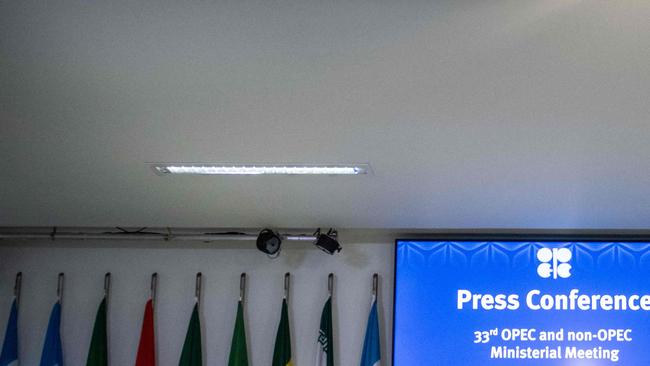
In the last seven days, Europe, OPEC and the US stepped back from what threatened to be an oil Armageddon. Russia emerged a potential winner, so not surprisingly Ukraine’s President, Volodymyr Zelensky, was not pleased.
To understand the drama on the global oil stage over the last week, we need to understand the forces behind the scenes that have been set out by CBA energy economist Vivek Dhar.
Firstly, the US no longer has the ability to increase shale oil supplies that existed in 2019. Accordingly, the world is much more dependent on OPEC and Russian oil.
US shale oil producers substantially reduced production after the 2019 peak in the midst of the Covid-19 crisis. In response to the Russian embargoes, they have been increasing production, but they are still well below the 2019 peak levels.
US shale oil producers have moved from being motivated by their ability to increase production to their ability to produce profits and dividends. Shareholders no longer want the extra production that comes at a higher cost and are enjoying the dividends.
This is a big strategic change and alters the US and global oil outlook.
Secondly, to put it bluntly, the oil sanctions against Russia are not working. It’s true that the sanctions really hit Russian oil production at the end of 2021 and at the beginning of this year Russian production slumped by more than a million barrels a day. But since last March Russian sales have been steadily climbing and most of the lost production has been recovered.
The big buyers have been China and India, who have enjoyed paying less than the market price for Russian oil.
But Europe had the power to destroy Russia’s ability to ship its oil to China, India and other countries. Europe and the UK control world insurance for tankers, and the Europeans had a proposal on the table to cease insuring tankers shipping Russian crude.
The world’s owners of oil tankers simply could not afford to risk large portions of their fleet without insurance cover. China and India receive their Russian oil by ship.
That insurance embargo would have been devastating for Russia, but it would also have left China, India and other countries desperately short of oil. Prices would have skyrocketed, creating an oil Armageddon. Europe pulled back.
Instead, Europe plus the G7 nations imposed a $US60 per barrel price cap on Russian oil. But it was a charade because most of the Russian oil is being sold at prices lower than $US60.
But the European Union will also impose ban all imports of Russian seaborne crude. It will need OPEC oil.
At the weekend, the OPEC producers, including Saudi Arabia and Russia had on the table a proposal to further cut back output from the reductions they already agreed to – reducing oil production by 2 million barrels per day, or about 2 per cent of world demand, from November this year until the end of 2023.
In anticipation of further OPEC production cuts last week, oil prices rose sharply.
I don’t know what impact the European insurance decision had on the OPEC countries, but they abandoned the proposal for further cuts and stayed with their existing reduction proposals. The oil price fell.
If demand in China remains depressed, then the oil market will almost certainly continue at lower prices. But China is attempting to regain momentum, including softening its Covid-19 clamps and releasing money to complete the half finished apartments.
If it achieves greater momentum, there will be a squeeze on the oil price given the combination of the US producer's stance and the OPEC cuts.
But meanwhile Russia will keep supplying China, India and other customers. The clamp will only become an issue if the oil price rises sharply.
The situation in gas is very different to oil and Russian sales to Europe have plummeted, which is putting great pressure on the world LNG market and its attempts to cover the Russian European shortfall.
At the weekend, I set out some of the forces that will influence Australia’s gas deliberations at this week’s national cabinet meeting.
Those deliberations need to be undertaken in the context of Australia being part of the world LNG community. The world will be very angry with Australia if it reneges on its export contracts and its contribution to the shortages because of local domestic issues, including the need of the government of one Australian state to retain inner city seats.
More Coverage
Read related topics:Russia And Ukraine Conflict





